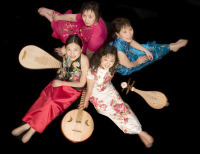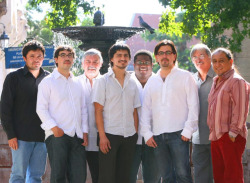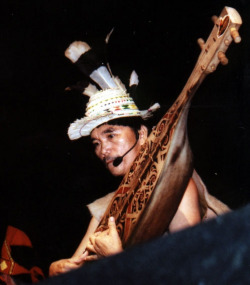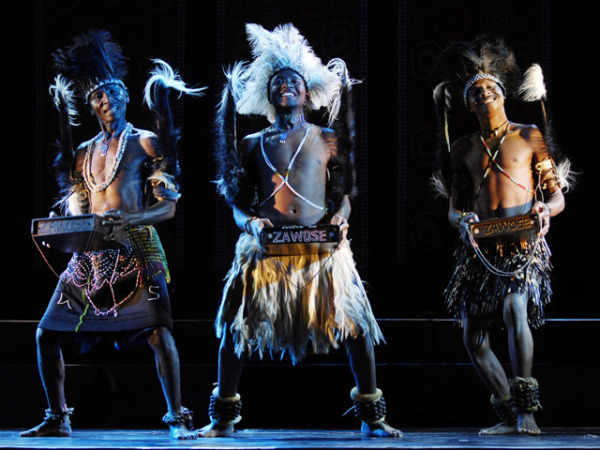Sarawak’s pride and music lovers’ delight – the Rainforest World Music Festival – is going to tingle with rare sounds and sensations, as Malika Naguran finds out from her interview with the show’s Artistic Director Randy Raine-Reusch.
Randy, what are some of the more unusual sounds or experiences that we can expect from this year’s Rainforest World Music Festival? You went at great lengths to source Inti Illimani for instance.

This year I have been fortunate to be able to invite some of the top representative artists from Chile, Hungary, China, New Zealand and Tanzania! This is a year of outstanding musicians. Inti-Illimani and Muzsikas are World Music legends with careers that span three decades and have huge international reputations. I am very excited to have artists of such stature to be performing at our festival.
Red Chamber has two of China's top performers in the group and you can't get any better than this! The Zawose family are famous for travelling the world with their now deceased World Music legend Hukwe Zawose. They are simply amazing and unlike any African band that has ever graced this stage. They will simply blow people's minds!
What are some quaint or endearing traditional musical instruments that the audience can enjoy watching being played, and listening to?
Well there are quite a few this year. The jouhikko is the feature instrument of Jouhiorkesteri. It is a small rectangular bowed lyre where the fingers actually fit through the body of the instrument to finger it. It is an instrument that you see in medieval paintings and the members of Jouhiorkesteri have been responsible for its revival.

Red Chamber - from Tang dynasty to jazz.
Muzikas will bring a gardon, an instrument that looks like a rough-hewn cello, but it is hit with a big stick as a percussive instrument, its really bizarre and amazing.
Moana & the Tribe will bring some very rare Maori instruments that are seldom seen. St Nicolas Okiestra (there are a few versions of this name depending on the language) will bring some traditional Polish instruments that we have never seen before as well. The list goes on...
You’ve played, I suppose, more than a hundred musical instruments and can be biased towards certain sounds that you personally enjoy. Are you on the lookout for something unique each time with the bands that you select?
Actually I have a collection of 700! I am not biased towards any one instrument, except I always want at least one traditional instrument in each group. I am always on the lookout for something that has not been here and will provide the audience with a new and exciting experience. I want this festival to always have some surprises.
What is your criteria for selecting the bands?

Inti-Illimani from Chile brings 4 decades of Latin American music.
I look for excellent musicianship, I always want a traditional instrument included, I want the band to be excited to be coming to Malaysia and Borneo in particular, I look for bands that really want to share their music and culture, while learning about the cultures in Sarawak and surrounds.
I look for bands that have not been here before, but when I bring a band back it is because I feel that it has something more to give to our audience. I look for styles of music or countries that have not been represented yet, but also styles that the audience really likes and wants more of.
I also look for a blend of impact, so that more acoustic groups perform early in the evening and appropriate for families, and louder more electric bands perform later in the evening for those that want to dance. I am trying to find more indigenous groups for future festivals, as there is a magic and purity in their performances that has been lost in other music.

Sarawakan Lan-E-Tuyang.
That is why I have brought the best sape players in Sarawak back this year, as their music is pure gold. Maybe local people may not appreciate it, but ask any of the other musicians once they hear it and they will tell you how special it is! I must say that I do shy away from music that I think might offend the sensibilities of my audience, but this just seems to lead me towards more sophisticated choices.
According to the lineup of performers, the range of the sounds is wide and exciting. Moana & The Tribe on the Maori tradition sounds more spiritual than world. But that can be argued. What is your definition of World Music? After having served as Festival Director for 12 years, has that definition changed?
Actually my definition for World Music has not changed; it was in long form "Music of, or stemming from a traditional culture." However I have been more often quoted in the short form "Local music, not from here", of course in Sarawak's case it is from here.
Music and spirituality have been mixed in every culture of the world, and many musicians look upon their music as their own form of spirituality, so the case of Maona still fits the definition. Oudaden also has that element but from an Arabic perspective. The world is vast and there are so many styles of music that our audience has not heard yet, and I hope to bring a lot of it!

Zawose Family Africa from Tanzania carries the legend of Hukwe Zawose.
Randy's photograph taken by Imran Ahmad of Escape Inc. The rest courtesy of organisers Sarawak Tourism Board.
This year, the performers that will dazzle the crowds three nights running from 10-12 July are: Inti-Illimani (Latin America), Red Chamber (Canada/China), Akasha (Malaysia), Poum TChack (France), Lan-E-Tuyang (Sarawak), Zawose Family Africa (Tanzania), Noreummachi (Korea), Maona & The Tribe (New Zealand), Jouhiorkesteri (Finland), Muzsikas (Hungary), Jeff & The Vida Bluegrass Band (US), Dazkarieh (Portugal), Oudaden (Morocco), Asika (Malaysia), Sekaa Jaya Jenggala(Bali), The St.Nicholas Orchestra (Poland).
Also featuring Rainforest World Crafts Bazaar. Be there, or be very left out!
Rainforest World Music Festival is on July 10th-12th, 2009 at the Sarawak Cultural Village.
Tickets online: www.ticketcharge.com.my